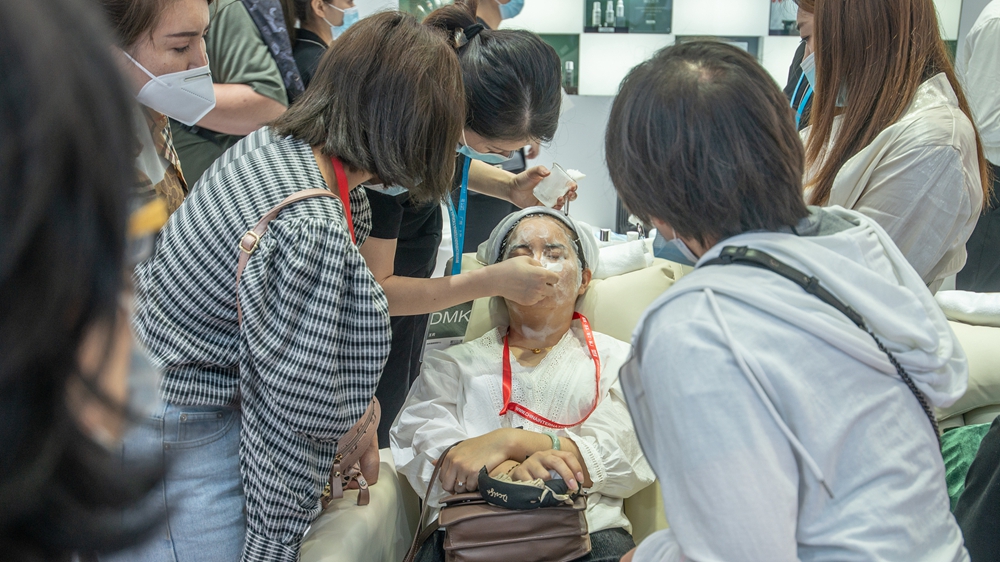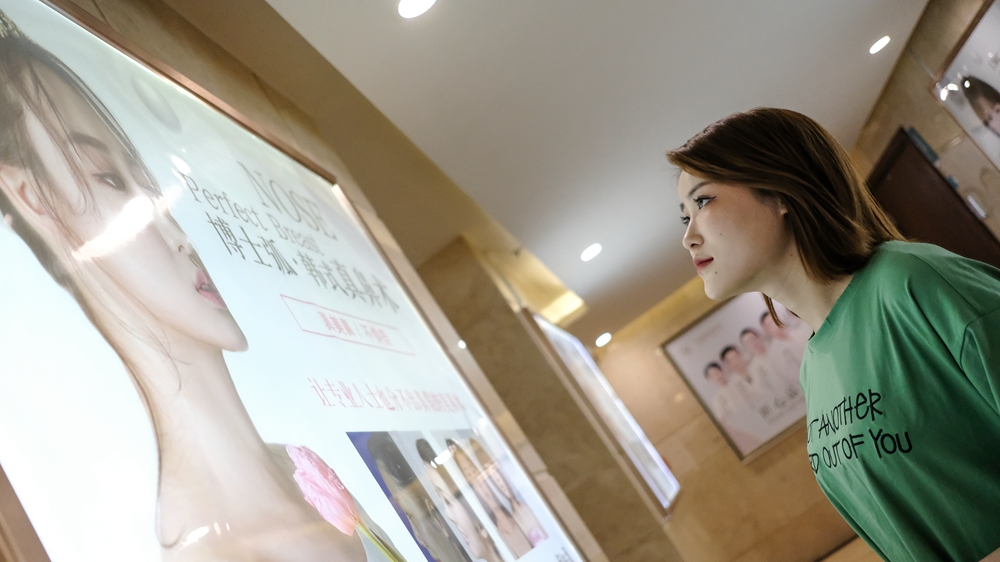
People gather to watch a woman being treated with a beauty product at China International Beauty Expo held in Guangzhou City, south China's Guangdong Province, March 10, 2021. /CFP
People gather to watch a woman being treated with a beauty product at China International Beauty Expo held in Guangzhou City, south China's Guangdong Province, March 10, 2021. /CFP
Men born in the 2000s and people living in less-developed areas of China have become the new drivers of the plastic surgery market in the world's most populated country.
After returning to her hometown in a rural area in Xinxiang City, central China's Henan Province during the Spring Festival, Chen Shanshan, who works in east China's Hangzhou City, discovered her cousin's wife was looking younger.
The woman told Chen that she got hyaluronic acid fillers and hydro-lifting treatment at a beauty workshop in the town, where the price is more affordable than in major cities. Chen was shocked to hear the news, because she used to think that this kind of plastic surgery was only going sought by young and rich people in urban areas.
In China's less-developed western areas, there are more and more public hospitals establishing plastic surgery departments to meet local demand.
In northwest China's Gansu Province, the plastic surgery department in Second Provincial People's Hospital of Gansu in Lanzhou City conducts more than 40 plastic surgery operations each month.
"In the past, doing operations like 'double eyelid' and epicanthoplasty were seen by doctors at public schools as indecent," said Wang Yongxiang, a plastic surgeon at the Second Provincial People's Hospital of Gansu.
Recalling that few experts once attended academic conferences held in Beijing on plastic surgery, Wang said in recent years conferences of that kind have attracted thousands of participants.

A young man looks at beauty products in Shanghai, August 5, 2018. /CFP
A young man looks at beauty products in Shanghai, August 5, 2018. /CFP
Another new trend is that male consumers are beginning to engage in the growing plastic surgery market.
In 2020, nearly 20 percent of male white-collar workers spent an average of 1,134 yuan ($174) on cosmetic products each month, which is just 66 yuan less than the money spent by female white-collar workers on equivalent products, according to a research report released by market consultancy firm iResearch on the consumption behavior of white-collar workers who have stable work with a family annual income of more than 100,000 yuan or personal annual income of 50,000 yuan.
According to the research report, in the age bracket between 19 and 22, 22.4 percent of male white-collars are pursuing cosmetic medicine, which is almost twice the rate among women in the same age group.
The report also indicated that 88.9 percent of the white-collar workers began their cosmetic medicine journey before the age of 30.
While young adults make up the mainstream in China's plastic surgery market, teens and older people are also joining the market, according to some plastic surgeons.
"Among my customers, there are teenage girls who are accompanied by their mothers to consult removing moles, and also elderly actors who choose surgeons to improve their facial skin," said Li Jialun, a plastic surgeon at Union Hospital affiliated to Tongji Medical College of Huazhong University of Science and Technology in Wuhan City, central China's Hubei Province.

A woman watches a medical beauty advertisement in Qingdao City, east China's Shandong Province, June 2, 2019. /CFP
A woman watches a medical beauty advertisement in Qingdao City, east China's Shandong Province, June 2, 2019. /CFP
Experts said the growth in cosmetic medicine consumption mirrors the fast development of the sector in China.
The cosmetic medicine market in China was worth 197.5 billion yuan in 2020, according to a report released by cosmetic surgery app Gengmei, which means "more beautiful" in Chinese, in December 2020.
However, there have been some accidents reported in recent years. For example, a 21-year-old woman reportedly lost her life during an operation at a beauty workshop in Changzhou City, east China's Jiangsu Province.
Experts said tragedies of this kind have much to do with the fact that qualities of the beauty workshops differ and some are not qualified to perform plastic surgery.
To ensure the quality and safety of the plastic surgery business, 17 provinces in China have established provincial-level plastic surgery quality control centers to inspect the qualifications and qualities of medical cosmetology.

